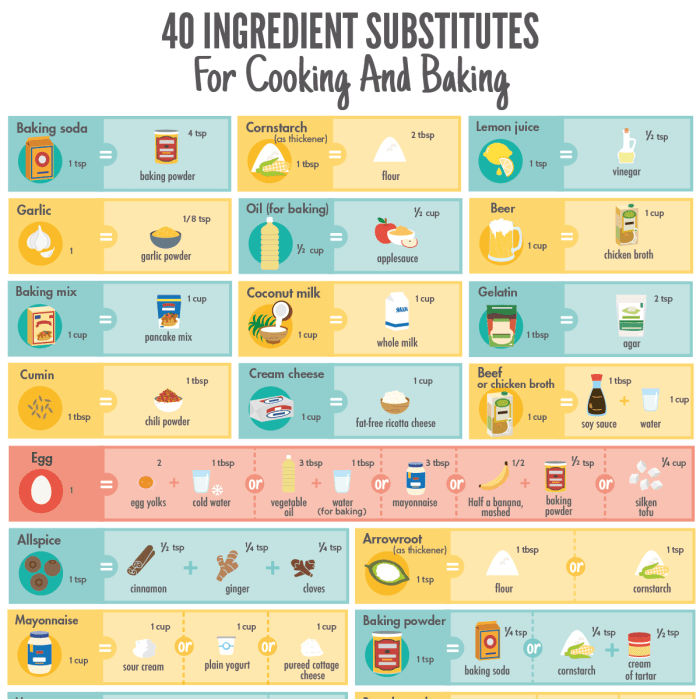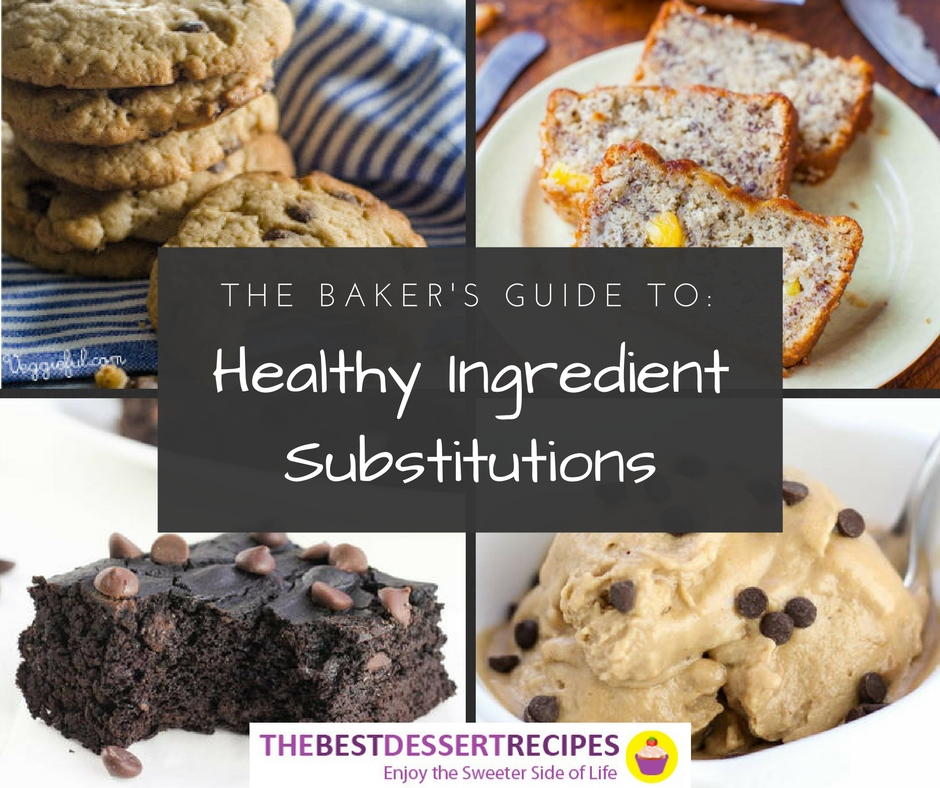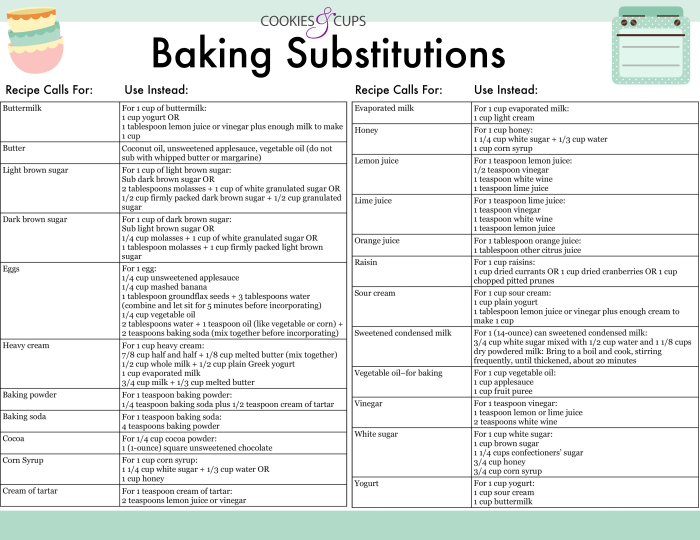Kicking off with Healthy substitutes for baking ingredients, this article delves into the world of healthier alternatives to common baking ingredients, exploring their nutritional benefits and impact on baked goods.
From whole grain alternatives to natural sweeteners and egg substitutes, discover how these swaps can elevate the health factor of your favorite treats.
Healthy substitutes for baking ingredients
When it comes to baking, there are several common ingredients that can be replaced with healthier alternatives without compromising taste or texture. Using these substitutes not only adds nutritional benefits to your baked goods but also enhances their overall healthiness.
When looking for a healthy and delicious breakfast option, consider trying this healthy banana oatmeal smoothie recipe. Packed with nutrients and flavor, this smoothie is a great way to start your day on a positive note.
White flour
White flour is a staple in many baking recipes, but it lacks essential nutrients and can cause blood sugar spikes. Consider replacing white flour with healthier alternatives such as:
- Whole wheat flour: Rich in fiber, vitamins, and minerals, whole wheat flour provides more nutrients than white flour.
- Almond flour: Low in carbohydrates and rich in healthy fats, almond flour adds a nutty flavor to baked goods.
- Coconut flour: Gluten-free and high in fiber, coconut flour is a great alternative for those with gluten sensitivities.
Refined sugar
Refined sugar is high in calories and offers no nutritional value. Replace refined sugar with these healthier options:
- Maple syrup: Rich in antioxidants and minerals, maple syrup adds sweetness with a unique flavor profile.
- Honey: Contains antioxidants and has antibacterial properties, honey is a natural sweetener that can enhance the taste of baked goods.
- Stevia: A zero-calorie sweetener derived from the stevia plant, stevia is a great option for those looking to reduce sugar intake.
Butter
Butter is a common ingredient in baking that is high in saturated fats. Consider using these healthier alternatives instead:
- Avocado: Rich in healthy fats and nutrients, avocado can be used as a substitute for butter in recipes.
- Greek yogurt: Low in fat and high in protein, Greek yogurt adds moisture to baked goods while reducing the need for butter.
- Applesauce: A great low-fat substitute, applesauce can replace butter in recipes while adding natural sweetness.
Whole grain alternatives
Whole grains are a great option to replace refined flour in baking recipes. They provide more nutrients and fiber, making them a healthier choice for baked goods. Here, we will explore different whole grain options, their nutritional value compared to refined flours, and tips on how to incorporate them successfully into various baked goods.
Whole Grain Options
- Whole wheat flour: This is a common whole grain alternative that provides more fiber, protein, and vitamins compared to refined white flour.
- Whole grain oats: Oat flour or rolled oats can be used in baking to add a nutty flavor and extra fiber to the recipe.
- Quinoa flour: Quinoa is a complete protein and can be ground into flour to use in baking for a boost of nutrients.
- Brown rice flour: Brown rice flour is gluten-free and adds a slightly nutty flavor to baked goods.
Nutritional Value
Whole grain flours retain more nutrients compared to refined flours because they contain the entire grain, including the bran, germ, and endosperm. This means they are higher in fiber, vitamins, minerals, and antioxidants, providing more health benefits.
Don’t let leftover rice go to waste! There are many unique ways to use leftover rice in your cooking, from making fried rice to rice pudding. Get creative in the kitchen and make the most out of your leftovers.
Tips for Incorporating Whole Grain Alternatives
- Start by replacing half of the refined flour with whole grain flour in your recipes to gradually get used to the texture and flavor.
- Adjust the liquid content in the recipe as whole grain flours tend to absorb more moisture than refined flours.
- Experiment with different whole grain flours to find the ones that work best for your favorite recipes.
- Consider adding extra binding agents like eggs or flaxseed to help the baked goods rise properly when using whole grain flours.
Natural sweeteners

Natural sweeteners like honey, maple syrup, and stevia are great alternatives to refined sugar in baking. They not only add sweetness but also provide additional nutrients and flavor to your baked goods.
Impact of using natural sweeteners on the glycemic index of baked goods, Healthy substitutes for baking ingredients
When using natural sweeteners in place of refined sugar, the glycemic index of baked goods can be significantly reduced. This means that the rise in blood sugar levels after consuming these treats will be slower and more controlled, which is beneficial for overall health and can help prevent spikes in blood sugar.
Tips on adjusting recipes when substituting natural sweeteners for sugar
- When using liquid sweeteners like honey or maple syrup, reduce the amount of other liquids in the recipe to maintain the proper consistency of the batter or dough.
- Since natural sweeteners are usually sweeter than sugar, you may need to adjust the amount used in the recipe. A general rule of thumb is to use about 3/4 cup of honey or maple syrup for every cup of sugar.
- Consider the flavor profile of the natural sweetener you are using and how it will complement the other ingredients in the recipe. For example, honey has a distinct flavor that may not work well in every type of baked good.
- Keep in mind that natural sweeteners can also affect the texture and browning of baked goods, so be prepared for some adjustments in these areas as well.
Egg substitutes: Healthy Substitutes For Baking Ingredients

Eggs play a crucial role in baking, providing structure, moisture, and leavening to various recipes. However, for those who follow a plant-based diet or have allergies, there are several alternatives that can be used as egg substitutes in baking.
Flaxseed meal, applesauce, and mashed bananas are popular choices for replacing eggs in recipes. These plant-based options not only serve as binding agents but also contribute to the overall texture and flavor of baked goods.
Flaxseed meal
Flaxseed meal, made from ground flaxseeds, is a great egg substitute due to its high content of omega-3 fatty acids and fiber. To replace one egg, simply mix one tablespoon of flaxseed meal with three tablespoons of water and let it sit for a few minutes until it forms a gel-like consistency. This mixture can then be used in recipes such as muffins, pancakes, and cookies.
Applesauce
Applesauce is another excellent egg substitute that adds moisture and sweetness to baked goods. To replace one egg, use a quarter cup of unsweetened applesauce in your recipe. Keep in mind that using applesauce may result in slightly denser baked goods, so adjust the leavening agents accordingly.
Mashed Bananas
Mashed bananas are not only a healthy egg substitute but also add a subtle sweetness and flavor to baked treats. To replace one egg, use half a mashed banana in your recipe. Bananas work well in recipes like quick breads, muffins, and brownies.
By understanding the properties and ratios of these egg substitutes, you can effectively use them in different types of recipes to achieve delicious and successful baked goods without compromising on taste or texture.
Final Wrap-Up

In conclusion, incorporating these healthy substitutes into your baking endeavors not only boosts nutritional value but also opens up a world of flavor possibilities. Experiment with these alternatives and witness the transformation in your baked creations.
Looking for a refreshing and satisfying salad recipe? Try this fresh avocado shrimp salad recipe that is perfect for a light lunch or dinner. With a combination of creamy avocado and succulent shrimp, this salad is sure to impress your taste buds.